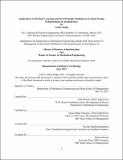Applications of Machine Learning and First-Principle Modeling to Evaluate Design Enhancements in Autoinjectors
Author(s)
Singh, Ankita
DownloadThesis PDF (3.983Mb)
Additional downloads
Advisor
Jonasson, Jonas Oddur
Roche, Ellen
Terms of use
Metadata
Show full item recordAbstract
One of the key guiding principles in Amgen operations is to ensure reliability of the offered combination products to best serve patients and maintain a competitive advantage for the business. With a broad device portfolio and increasing sales volume, Amgen now has access to large data repositories and an opportunity to realize its value to “Be Science Based” and utilize this data in innovative ways to improve product designs and training programs. The goal of this project is to use machine learning to augment design decisions and provide products that truly resonate with Amgen’s mission - “To serve patients”.
This thesis presents a hybrid machine learning and first principle based model that can be used by Amgen to enhance the feedback loop between user experience and product design teams. By leveraging data on predicate autoinjector devices, we created models that can produce user experience insights and provide predictive capabilities for future product designs.
The methodology to generate our models relies on theoretical first principle modeling and data science. We utilized domain knowledge to extract product attributes that contribute towards user experience. One such attribute was drug injection time for an autoinjector. The theoretical model used autoinjector design and drug product features to predict drug injection time. The machine learning model used drug injection time data along with other product design parameters to predict user experiences.
The results of our model provided a direct link between the design attributes and user feedback metric. The accuracy of the hybrid model varied between 50-70% depending on the algorithm used. The first principle model results were very close to the empirical injection time data with only 12% error.
Furthermore, the thesis presents an in-depth analysis on the interpretability of results by utilizing techniques like partial dependence and permutation variable importance charts to enhance the understanding of results generated by a machine learning model.
Date issued
2021-06Department
Massachusetts Institute of Technology. Department of Mechanical Engineering; Sloan School of ManagementPublisher
Massachusetts Institute of Technology